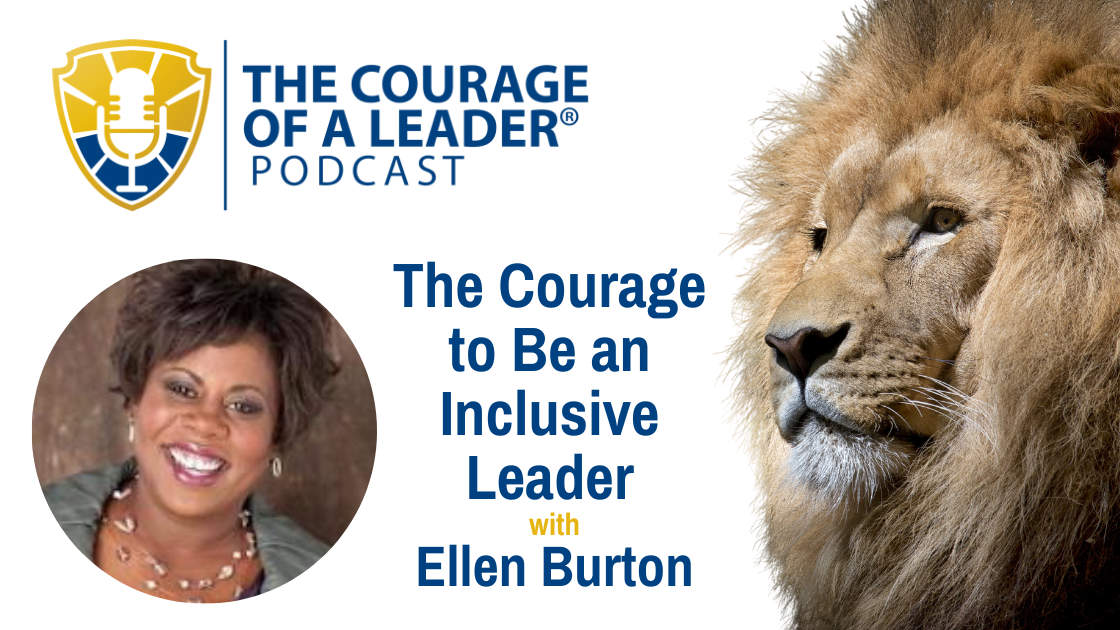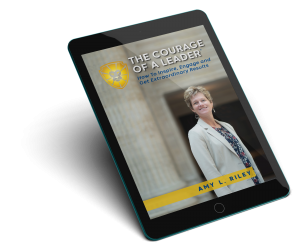This guest episode, “The Courage to Be an Inclusive Leader,” with Ellen Burton will give you concrete concepts and guidance to be the inclusive leader your team desires and deserves. Ellen is an international speaker on business issues which include workplace culture, diversity, equity and inclusive leadership. Ellen speaks about this nuanced topic in a clear, understandable, and accessible way. I’m glad you’re here to listen in!
About the Guest:
Author of the Amazon Best Seller, The Civility Project: How to build a culture of reverence to improve wellness, productivity, and profit. Ellen is an international lecturer on business issues which include workplace culture, diversity, equity and inclusion and inclusive leadership. In her 27th year as an Executive Coach and consultant, Ellen has supported C-suite executives, executive directors, and business owners in establishing and exceeding their goals.
Those who coach with Ellen improve their focus, influence, capacity as effective leaders and therefore, results. Ellen serves on several boards including Newfield Network, an ICF Coach Training corporation and The Open Studio Project. She is an avid golfer, novice tennis player, community volunteer and is active in her church. Because of working with her Coach, Ellen is powerfully contributing to the world while happily and gratefully living a life beyond her wildest dreams.
The best way to reach Ellen is through her website, http://www.coachellenb.com/ and this contact number 847.721.6494.
About the Host:
Amy L. Riley is an internationally renowned speaker, author and consultant. She has over 2 decades of experience developing leaders at all levels. Her clients include Cisco Systems, Deloitte and Barclays.
As a trusted leadership coach and consultant, Amy has worked with hundreds of leaders one-on-one, and thousands more as part of a group, to fully step into their leadership, create amazing teams and achieve extraordinary results.
Amy’s most popular keynote speeches are:
The Courage of a Leader: The Power of a Leadership Legacy
The Courage of a Leader: Create a Competitive Advantage with Sustainable, Results-Producing Cross-System Collaboration
The Courage of a Leader: Accelerate Trust with Your Team, Customers and Community
The Courage of a Leader: How to Build a Happy and Successful Hybrid Team
Her new book is a #1 international best-seller and is entitled, The Courage of a Leader: How to Inspire, Engage and Get Extraordinary Results.
https://www.linkedin.com/in/amyshoopriley/
Links mentioned in episode and related resources
Mastering Civility by Christine Porath – https://www.amazon.com/Mastering-Civility-Manifesto-Christine-Porath/dp/1455568988
Choosing Civility by P.M. Forni – https://www.amazon.com/Choosing-Civility-Twenty-five-Considerate-Conduct/dp/0312302509/
Professional Leadership by Ellen Burton, et al – https://www.amazon.com/Professional-Leadership-Angela-Armstrong-PhD/dp/1914265351/
Biased by Jennifer L. Eberhardt, PhD – https://www.amazon.com/Biased-Uncovering-Hidden-Prejudice-Shapes/dp/0735224951/
Nice Racism by Robin DiAngelo, PhD – https://www.amazon.com/Nice-Racism-Progressive-People-Perpetuate/dp/0807074128/
Six Characteristics of Inclusive Leaders – https://deloitte.wsj.com/articles/6-characteristics-of-inclusive-leaders-1463083402
The Civility Project: How to build a culture of reverence to improve wellness, productivity and profit – http://amzn.to/2KOuLZk
Call to action
Intentionally strive to be an inclusive leader. As discussed in this episode,
1) Pay attention. Ask questions. What is and is not working for others? Whose voices are and are not being heard?
2) Dig in. Check if someone was offended. Ask what works. Apologize.
Thanks for listening!
Thanks so much for listening to The Courage of a Leader podcast! If you got inspired and/or got valuable leadership techniques you can use from this episode and think that others could benefit from listening, please share using the social media buttons on this page.
Do you have questions or feedback about this episode? Leave a comment in the section below!
Subscribe to the podcast
If you would like to get automatic updates of new The Courage of a Leader podcast episodes, you can subscribe to the podcast on Apple Podcasts. You can also subscribe in your favorite podcast app.
Leave us an Apple Podcasts review
Ratings and reviews from our listeners are extremely valuable to us and greatly appreciated. They help our podcast rank higher on Apple Podcasts, which helps us ignite The Courage of a Leader in more leaders! Please take a minute and leave an honest review on Apple Podcasts.
Teaser for next episode
Tune in next for “The 4 Secrets of Composed, Confident, Charismatic Leaders” with Carrie Beckstrom, CEO of PowerSpeaking. She breaks down the concept of Executive Presence for us, and you don’t want to miss her clear, easy-to-follow guidance for speaking and showing up more powerfully.
Transcript
This guest episode, the courage to be an inclusive leader with Ellen Burton will give you concrete concepts and guidance to be the inclusive leader your team desires and deserves. Ellen is an international speaker on business issues which include workplace culture, diversity, equity and inclusive leadership. Ellen speaks about this nuanced topic in a clear, understandable and accessible way. I'm glad you're here to listen in.
Amy Riley:Welcome to the Courage of a Leader podcast. This is where you hear real life stories of top leaders achieving extraordinary results. And you get practical advice and techniques, you can immediately apply for your own success. This is where you will get inspired. And take bold, courageous action. I'm so glad you can join us. I'm your host, Amy Riley. Now, are you ready to step into the full power of your leadership and achieve the results you care about most? Let's ignite the courage of a leader.
Amy Riley:Always appreciate having time with you, Ellen, and I'm looking forward to our conversation today. I know we decided to talk about a very important leadership, intention and outcome is to be an inclusive leader. How Ellen do you define or think about inclusive leadership?
Ellen Burton:There's so many facets, but I think the thing that comes most clear to me is an inclusive leader is someone who's paying attention to who's in the room. And which is interesting because it falls right along the lines of the description of gosh, you know, like empowering later that falls along the lines of emotional intelligence, like what is the high emotional intelligence look like, which we know now is a huge factor in professional success, regardless of what the profession is. I can also say that an inclusive leader is someone who gives everyone a voice, when there's an opportunity. It's someone who has an ally to underserved populations within that organization, someone who is sensitive to the fact that everyone in the room may not have had their same journey. And, and he or she is curious about other people's perspectives and journeys. Because there aren't very many professions where the client does not need to look or the customer, the client, the customer, right? Yeah. Should the the internal people should reflect what the client looks like, right or wrong? How are we gonna really know? Yeah, so that leader is making sure that they are hiring people who are different than they are right, like the neurological diversity that we talked about. As well as experience, you know, professional experience personal experience like that, because that leader wants to tap into everything they can in order to produce results.
Amy Riley:Wow. Ellen, you just said a lot. That an inclusive leader is empowering, emotionally intelligent. They're giving everyone a voice sensitive to differing experiences. Curious, right? They're hiring a variety of talent. I'm making sure that reflects their customers, their communities that they're playing in. And I actually really love the first thing that you said, paying attention and inclusive leaders paying attention. It is active, right? It's not just okay, I've hired my diverse team. Here they are. It's active every day tuning into how to make everything you just said, possible.
Ellen Burton:Yeah, well, there's a point there that you made to which is brilliant. And that is 25 years ago, when DNI Diversity, Equity and Inclusion became a hot topic in the business world. There was a big push to hire people who look differently than the leaders. And quite frankly, most of the leaders in the business world were straight white male, right? And so the idea was, let's, you know, put some color and variety in here. The problem was there was no development when it came to equity, equal opportunities for development and advancement, and very little interest in what does inclusion mean, right and say, 25 years later, we're using the word belonging as well, like do people actually not feel but know that they belong in this organization because of our behavior and So one of the things that we do with my company as we ask the leaders like what are your values? And how do you see your values acted out? Like what is the behavior that would tell a candidate? Right? Or your the people who are already working for you that they belong here? Right. And we know from years and years, I think we can attribute this to Oprah who probably attributed a lot of psychological research. All human beings want, like, the basic thing is to know that they matter, right? Maslow's hierarchy of needs, right? Like that I have a community that I belong, yes. And leaders have the chance to do that. I mean, it's really quite a responsibility and, and quite a gift to extend to someone you know, like, you matter. Yes, matter.
Amy Riley:Yes. I want to drill down on that further, Ellen. But first, let me let listeners know more about you. Ellen Burton is my guest today and she is the author of the Amazon best selling book, the Civility Project, how to build a culture of reverence to improve wellness, productivity and profit. Love that title. Ellen is an international lecturer on business issues which include workplace culture, diversity, equity, and inclusion and inclusive leadership. Our topic today, in our 27th year as an executive coach and consultant Ellen has supported C suite executives, executive directors and business owners in establishing and exceeding their goals. Clients of Allens include the city of New York, the University of Chicago, Barclays, Kellogg, SC Johnson, Humana healthcare, the New York Association for advancing racial equity, the United States homeland security, US Army, Air Force, and Navy. Ellen serves on several boards, including new field new network, and ICF, Coach Training Corporation and the open studio project. She's an avid golfer, novice tennis player, community volunteer and is active in her church. Because of working with her coach, Ellen is powerfully contributing to the world, while happily and gratefully living a life beyond her wildest dreams. I'm so glad to call you a colleague, Ellen and to have you with us today on the podcast.
Ellen Burton:Thank you. I'm really glad to be here.
Amy Riley:Yeah. So before that introduction, you were talking about something really important about giving all the diverse members of our community, our organization, a sense of belonging, and you are tying this to values. Can you say more about that are given an example? How do we articulate and lean on values in order to create a sense of belonging.
Ellen Burton:It's a direct line actually, and a lot of people don't know that direct line. I think that a lot of executives as they grow up in the business world, maybe from 22, or 24, out of college or grad school, until they hit a C suite position, or maybe owner or CEO of the company, right? They've learned how to behave. They've learned how to show respect and dignity, whether it's somebody from the town next door or somebody from across the globe, right, like learned etiquette, they learned respectable tone, volume, how to treat people, when you want them to hear you and how you want to be heard, then they assume that everyone else knows how to behave. So when we have a situation of a manager who's frustrated, a manager who may be carrying prejudice of some kind or another, it just, it's the leaders that I work with, it just blows their mind that these people don't know how to act. And then I say, and then I hear people say things like I one client who used to say, it's just common sense. It's just common sense how to behave, you know, how to lead how to manage, and it's like, leadership is a high high level skill. Right? inclusive leadership is an additional skill, right? There's no common sense to it. And if I have a leader who's 55, and most of her team at 25, common sense is made up of experience when failure, education, you know, mean, like work experience, it's like, it's not I don't know what you know what the definition is of common sense, but it's not universal. And so I work with leaders and say, what is important to you? What are your values a common belief? What do you believe, right? And then what are the behaviors that are going to support how you believe your employees should treat each other? So then we teach him about conflict management in a timely manner. We do a lot of training and development around emotional intelligence. We work with the leadership team around inclusive leadership. To like, you know, basic, inclusive leadership skills, and then they go away and try some and come back and work with their individual coach. I mean, is this is not common sense, right. And the other cool thing is that once the leaders identify how they want people to treat each other internally, they have a way to measure it. And that measurement should be attached to compensation, it should be attached to developmental plans, it should be attached to conversations that happen on a regular basis, and the development of your people is a huge responsibility that all managers should be held accountable for, right? Because we know that the millennials and the Gen Xers and now the Gen Z, the iPhone generation, they will not stay if they don't feel like they're growing into being developed. So this is a huge retention tool to be an inclusive leader.
Amy Riley:Yeah, absolutely. I'm taking some notes over here, Ellen, and I wrote common sense. And I put a line through it. Right. And Dad, it's paying attention. Instead, it's being intentional. Right, and here's like, we're reflecting, we're thinking about what's important to us. How does that get demonstrated in behaviors? And if we're behaving this way, what metrics? What bottom line results will be impacted? As a result of engaging in those behaviors?
Ellen Burton:Well said, well said, a lot of the clients who come to EJ Burton and associates will say, I don't like the way people are treating each other internally. Or they see, you know, the extreme is when you see violence in a workplace, like, what happened about a month ago at Wal Mart, a manager a young man young, right, 30 something, the feedback from the employees was, he wasn't wild, like, nobody wanted to go to him. You know, there's obviously something going on. He had been, he'd been there for over 10 years, and had been a manager for four years. And it's hard for me to believe that like nobody, nobody saw that this, you know, this is a young man, I'm gonna call him a kid, because I'm a woman of a certain age, nobody saw this man in such distress and that he came in one day and shot his colleagues and men kill themselves. That's the extreme, but they'll behaviors of the manager who nobody wants to go to the manager who doesn't have developmental conversation, the person who is the biggest salesperson, but treats their internal support staff, terribly. Right. And so there's a lot of turnover. And one of the things we want to bring to the attention of the CFO is, you know, it really is, you know, Sarah really making you that much money if you spend $300,000, replacing somebody on her team, right? Every 18 months. Yeah, like, how much money is she generating? Because all they look at is like the big sales numbers, not the impact of behavior. Yeah. So I love your point about you know, we really got to look at like the full picture, and decide like, what's the impact on the worker, because people come to work for their manager.
Amy Riley:So this is taking my brain, Ellen to each leader out there, who is a people leader, considering intentionally? How is each team member doing? How do you create a sense of belonging for them? How do you make it comfortable and safe and great for them to show up as their full selves and share their ideas and perspectives? I think it's paying attention. I think it's also some asking, right, like what's working for folks? What do you need? Right, asking them questions to find out about who they are and where they come from, and how they see the world.
Ellen Burton:Yep, got it. That's behavior, right? So intention is good. And then it has to be followed up with behavior. And by the way, the top leadership team also has to be held responsible for behaviors that are inclusive, right? So you can't push it down. You have to hold each other accountable as well. And we teach people how to do that in a respectful way. Like if somebody's in a break room, and they tell a blonde joke, you know, we just kind of say like, hang on, you know, we don't we don't do that here. Right. Like, I know, you're kind of new. And, you know, and orientation gave you some guidelines, but I just want to tell you right now, we don't we don't tell any kind of jokes that might demean somebody. You know, well, there's nobody here. That's blonde. That's not the point. You know, we have a respectful and I love what you said emotionally and psychologically safe workplace. And this is how it happens. Right? But here's what I hear from managers all the time. Yeah, I'm already so busy. I don't even think I have time to be inclusive. Yeah, and I gotta tell you, right, like, you know, like that. And here's what's interesting. It's like, it actually takes less energy and time to be considerate. Right, which is what we already everybody pretty much does. Anyway, just with consideration with intention, right? So it's like using people's names, right? Like, I mean, look, 104 years ago, Dale Carnegie said, you know, I'm gonna misquote this. A person's name is the sweetest sound they've ever heard. Right. But today, we need to also add in the idea that pronouns are hugely important. Yes. Right, using somebody's preferred pronouns, looking at people in the eye when you're talking to them, whether it's on Zoom, or whether it's in person, right, that says that you matter, which means that we're not multitasking. I'm so guilty. Yes, you know, because we're learning, right? Like, asking instead of giving the person or attention, and if you can't give them your full attention, say, I can't give you my full attention right now. Give me about 10 minutes to finish this email. And then let's talk. Yes, right. That's all you got to do. If you misspeak, then say, like, you know, gosh, you know, I said, let me introduce you to the girls on our tech team. And then you're like, girls, right? Because like, they're about 35 or 40 years old. And then you just turn and say, I cannot believe I said that. You all right? Like, please forgive me. I'm still learning, right? So And I gotta tell you, we all have to be patient. And we all have to show grace. Right? Like, we all have to show each other some grace and say, you know, like, George, if you call up girls, one more time, we're going to come to work and Girl Scout uniform? Like, is that what you want? Is that what you want? You know, like, mistakes can be made light. But with, you know, like, clarity. Like, that doesn't feel good to me. Yeah. And there's times when you can say, that doesn't feel good to me. I wonder if you can say it in a different way. Lovely.
Amy Riley:Ellen, so many people think, oh, goodness, right. We're getting overly politically correct. There's nothing you can say can't tell any jokes anymore. But I know, every time we chat, I laugh and laugh with you and you are funny. And at no one's expense. Right? We can, we can still be funny. And I love this. Bring grace, bring patience with others and with yourself. And honestly, if we're jumping in and we're working to be inclusive in ways that we haven't in the past, we are going to make mistakes. We are going to be we're gonna say it wrong. If we're paying attention, we're gonna see oh, I don't think that that landed the way that I intended for that person. Right. I was saying, speaking to their experience and where they're coming from and Okay, now, like, they look uncomfortable. I've put them on the spot. We could do something wrong. Apologize. Dig in and and find out what will work in that situation with that individual.
Ellen Burton:Yeah, right. Yeah. And asked to write I, you know, I think I referred to you as she and I know that you like the pronoun they. Did I just say that? You know, and the person will say, like, Yeah, you did, but it happens to me all the time. You know, in the future, just know that I don't identify as male or female, just like, you know, like, it's a conversation, right? Yeah, everything's not a hit. And if it occurs to you two days later, that's okay. Go back and clean it up. Later, go back and clean it up. The idea here is that you can't have trust, unless you have the, you know, uncomfortable conversations. They're not always hard. They're just could be uncomfortable. And coming at them with humility, not humiliation. And we're not trying to humiliate others. But just coming at it with humility and saying, like, I think I misspoke, I think I screwed up. And the person might say to, you know, you said, they, that's good. And you'll be like, you know, I'm learning.
Amy Riley:I want to underscore what you said, Ellen about, go back and clean it up, or go back and ask, because I've, I've seen I've worked with leaders who are resisting that, well, maybe they didn't notice or maybe it didn't offend them, or I'm gonna make it worse. If I go and I talk about it. And I think that has to do more with our own discomfort. Right, and we got to work on our willingness to be humble and stepped through the discomfort and have that connection. Even though it might feel a little awkward or messy at the onset to go and to go and clean it up. I think it's one of those things it's easier said than done but it this is this is critical. This is the work. Yeah,
Ellen Burton:absolutely. And awkward is the is the key like awkward, it's not gonna kill you. Right, like awkward is just one of those that you emotion that comes and goes like the weather. And so it's like step into it, you can even say, This feels really awkward to me. And that kind of calms things down in a different way. And it makes people be able to listen better. I think that we realize that you learn less while you're talking, you know. And right now, while we haven't invented anything new in a while other than my talking refrigerator, innovative ideas as we can get, right, because the economy needs us, we need these young people's ideas, we need the ideas of older citizens in our communities and our workplaces, who have some wisdom and perspective of time, when you know, all of that. And the last thing you want to do as a leader is shut that down. And sometimes you don't even know you're doing it, you know? So at meetings, right, I see this at meetings all the time a leader comes in, they've got an agenda, they've got, you know, 45 minutes, which we advocate, you know, meeting 20 minutes or 50 minutes, no longer than 60. And so they want to pop through their agenda. And when somebody says, well hang on a second, because this is making me think of and the managers like, you know, we got no time for you to say anything, it's not on the agenda. Yeah, you know, send me an email with of course, nobody wants that. Right. So we've got to, we've got to make some room for brainstorming for ideas for innovation, creativity, and people will only do that if they feel safe.
Amy Riley:Yeah, yes, we want to talk about bias. Right. So I'm a people, leader, all people leaders out there, and we want to be inclusive, but yet, we also have heard and know that all human beings have some kind of unconscious bias, because we've had some kinds of experiences and not other kinds of experiences. And it gives us filters and auto perspectives. Right? So if that is happening inside of us, aren't we going to be more prone to make mistakes?
Ellen Burton:Probably, which is fine. You know? So here's the thing about bias bias is a neurological response. Right? Your body, your brain trying to protect the organism? You You're the organism, right? And it is natural, and it is good, right? Like your brain is always kind of scanning that periphery for where do I put this? Right? Like, does this go in a safe pile? Does it go in a drawer does it felt safe, unsafe, safe, unsafe, that's what our brains are constantly doing? And so Okay, right. The trick here is, and you know, I love it when people say, Well, now that you told me it's conscious, how can it be? The thing is about 20,000 of these, this, this, you know, scanning and cataloging happens every minute, right? And so a lot of times, we will see something, you know, and I tell the story, it embarrasses me. But I tell the story, because I think it's a great teaching point, I'll be walking down the street and three black kids are coming towards me bouncing a basketball, they're six foot tall, I'm five foot something else. And I'm a woman of a certain age, right, and I got a pocket book on my finger. And, and when I see them walking towards me, depending on the time of day, depending on what I feel, my first my brain goes, am I safe? Yeah. So bias. Unconscious bias is based on what we've been taught a lot of media, you know, interaction, like the media will say, young black men, you know, danger, you know, Chicago, danger gun, you know, car jacking? You know, like, that's the first place because that is piped into my brain over and over and over again. The trick with unconscious bias is to question the first thought, nice, is it true? And God bless Byron, Katie for her work, right? Is it always true, right like that. And then, so I'm not responsible for my first thought, I am responsible for questioning my first thought, and the way to manage your unconscious biases, then to understand that you get to choose your behavior. If I'm not aware that that unconscious bias, I see three young black men walking towards me, young black kids, or whatever. And my first response is to grab my purse closer to my body or to cross the street. Right. And I go, Oh, that's my first thought. You know, and the question is, is it true? Like they're paying no attention to me whatsoever? And middle of the afternoon, right? You know, it's, you know, it's like, it's like going to the grocery store and seeing a really hot guy, you know, working at the grocery store, and you're like, you know, like, here's my margarine, right. And then the guy goes, may I help you, man, you know, and I'm like, but Right, like, yeah, y'all have a story. You know, we see somebody and we have story about who they are and what they mean to us. The first place is, is it safe? The second place is what category do I put this in? All right. Do I need to remember this? Do I need to let it go? Yeah. And so you know, and so we can't shame ourselves for our neurological response, you know, like, you can't stay in yourself or sneezing, right? You can't shame yourself for having an itch, and then scratching it like that makes no sense. Like, look at me, I'm useless. I'm no good. So while I say, you know, seeing these kids makes me, you know, seeing these kids and having the first response makes me embarrassed. It's a little shame on me, like, you know, I know, this isn't a true story. Now I get to choose my behavior. Yeah. So being a woman of a certain age, I'm going to pay attention, right. But I also don't have to act afraid, because there's nothing threatening there. The story says, This could be a threat because they're black. And then the question is, is it true? Right, like, so that's, that's been my experience about managing unconscious bias. We all have it. Yeah. Okay. Okay, how do I manage it? So the fun thing to do with this, Amy is just play with it, like you've seen on TV, right? And go, like, what's the story I have about that? Where you go to the grocery, right? And you say to yourself, you know, just kind of play like, what's the story I have about that? The homeless guy, or a guy who looked homeless, but it's actually wearing, you know, for $4 jeans that are torn up? Like, Oh, that guy's homeless? No. So you know, it's like that, right? Like, I have a story about a guy with torn up jeans, what's the story? And you don't have to do anything, just kind of play with it. Right?
Amy Riley:Thank you. I mean, what a gift if listeners can step into that. I'm feeling like this is a gift right now to be playful with it. And it's coming back to your concept of not playing the game of perfection here. Because let's be honest, Alan, when I think about it, I like to think I have a little less unconscious bias than everybody else. Right. But when you name it as a neurological response, it's a neurological response that we're not responsible for. And not only is it due to what we hear in the media, what we've been exposed to in our lives, it's also I heard this the other day, what is unfamiliar to us? Right? So an Asian female, being the pilot on my plane, unfortunately, is unfamiliar. And, you know, this is saying, even if we see that we might be very excited to see that. Yes, right. Love, love to see this female as the pilot of my plane, but it's unfamiliar, our brains can still have a neurological response, and that we're not responsible. We're not responsible for that. We don't have to shame ourselves about that. We're responsible for our second thought, We're responsible for our behavior.
Ellen Burton:We're responsible for question it, right? Like, yay. Oh, our brains, you know, like our hearts like, Yay, you know, girl power. And our brains are like, I don't know. Yeah. Sounds familiar. Right? Because it's ridiculous. Ridiculous. But we have to let that part come up and go, is it true, and then we go, ridiculous, like, right? And then laugh at yourself and keep going in the workplace. It shows up like this. I'm a straight white male. And I have to give feedback or developmental feedback that somewhat negative to a will use your Asian female who has piercings and tattoos, right. And I'm barely comfortable talking to her on a day to day, but now I have to give her feedback that she's not really doing her job well, and I'm afraid she's gonna complain to HR, because she's gonna think I'm doing this out of prejudice. Yeah. I hear this often. Yeah. So I don't give them any natural feedback.
Amy Riley:Yes. So I avoided Yep. Right.
Ellen Burton:And so the question to that leader is, is it true that she's going to assume that you're prejudiced,
Amy Riley:right. Or she can assume you're prejudiced because she's not getting feedback from you?
Ellen Burton:Right, but there's B, then our behavior changes, because we just go with the first thought, instead of finding the first thought. The other cool thing is that if you have colleagues or everybody's got a boss, right, sent me an email, right, but certainly like, but we use each other, right to say like, here's the story I have about this employee. All right, and then you'll say to me Well, and I don't know that she's gonna think you're prejudiced. Is there other behavior that would make her think you were prejudiced up until this developmental conversation, and then I gotta kind of say like, no Oh, you know, we go to after dinner after work parties, and we have been each other tones and right like that, for us has already been established that the emotional psychological safety has already been established. So then my first thought doesn't really match what happened. And behavior is everything, you know? Yeah. Yeah. I used to date a guy who would say, what's their feet? And I would be like, What are you talking about? Right?
Amy Riley:What was he talking about?
Ellen Burton:I don't know. He was incredibly attractive and fun and nice. So I didn't really care at the time. But I know what he's talking about. Like, you are so pretty. No, because here's the thing, like he was saying, watch their behavior. It's not their words that you need to listen to.
Amy Riley:It's their behavior. Ah, okay. Okay. Okay, watch their feet. Because if their feet do the walking lunges,
Ellen Burton:okay. I guess, you know, like their behavior will speak, actually speak louder than words is what he was saying.
Amy Riley:Yes. Yes. Ellen, it's coming full circle to me to pay attention. Pay attention to the first thought that comes up. Right, let that be. Be responsible for our second thought, pay attention to how we're feeling in the moment, right? If we're feeling uncomfortable, if we're feeling hesitant, what is that about? Pay attention to other people? Right? Are they engaged? Are they participating? Are they not? What is their body language telling you? That inclusive leaders are constantly paying attention in here and out there? And digging in?
Ellen Burton:Yeah, I mean, the bottom line is you want your workers to, you want them to be present, first of all, so there's a role model opportunity here. And secondly, people who again, feel like their boss has their back, feel like their boss cares about them, you know, like, this doesn't mean you have to go babysit for them, right? Like listening. And being present is huge, right, trying to solve problems with them, or having them solve problems themselves, and then giving them feedback on the process. All of that is your job. But if your head is down in a spreadsheet all the time, you are missing a huge opportunity to make your your workload lighter. Because you could be you could have people who are like happy to be delegated to, you can have people on your team who want to stretch their skill set. Right. And they will take your direction and take your guidance and take your encouragement and enthusiasm with everything that's intended because you have made it safe for them. Yeah, right. So then productivity increases. And when the topic, the title of my book, as you mentioned, people get healthier, right? Like when you're around somebody who's really negative and nitpicking or flat out just being abusive, using profanity in the workplace, stuff like that, your immune system starts to suffer. And here's what's interesting to the research that was done by Harvard professor, I'm blanking out on her name. I have a huge respect for this woman and I'm blanking out on her name. I apologize. We can put. Okay, good. What is that what they found in the research was that even if you're not the one who's being bullied, if you're observing it, or if you're in the room, or in the cubicle, or whatever next to it, your immune system starts to suffer. Yeah. So now you have people taking, you know, mental health days, but you also have them taking sick days. Yeah. That you know, and I hate the word toxic workplace. I don't like that at all. But because the workplace becomes unsafe and unsure, there's no steadiness of behavior. And obviously, the opposite is true. If people feel safe, they feel respected. They feel seen and appreciated. They're going to dig in. Right.
Amy Riley:Okay, Ellen, I'm so glad that you said that. Because when I was saying pay attention, that's only part I mean, it's it's access. But we need the tap in to others strengths and values and perspectives. We need to step in. When something when someone's not being treated. Well, we need the show it we got we got to change our behavior. We have got to try new behaviors. Yeah. Which takes courage. It takes courage. All right, yes, all of this.
Ellen Burton:There are two awesome things about what you said. One is you don't need international corporate policy to be an inclusive leader. This is a personal issue that you can choose a different way of looking at things and try some new skills. So that's great. It will take courage to speak up and say, I want you to know that I have a lot of respect for you. And I know that you're trying hard but we need to talk about some places where you're missing the mark in your performance. It will take Alright to say, you know, we're having a team meeting with the CFO, and the CFO makes a joke about black people, and to say, You know what, CFO, I just, I don't know whether I should stop you now or stop me outside the room. But in order to advocate for my team, I have to tell you that that joke is off color and appropriate. And I wish you would find another way to make your point. Right, so you do it in the meeting, you do it out of the meeting, but
Amy Riley:you do it or do it and yeah,
Ellen Burton:and then here's what's interesting. If you find that you are demeaned, demoted, or fired, because you spoke up and in defense of other people's spirit, then chances are your values are not in alignment with the values of the company. Yep. And chances are it was there was already signs that it was time to go. Right. I mean, this is when people have the hardest time when their values don't align with their leadership. Absolutely.
Amy Riley:Absolutely. So many great things that you have said today, Ellen, pay attention, take action. Bias is a neurological response. We're not responsible for that. We're responsible for our second thought and the behavior that we take and the acknowledgement that all of this takes courage. Thank you for being with us today. Ellen, I always enjoy spending time with you.
Ellen Burton:I feel the same way. Amy, thank you for the opportunity.









 A Summary of The Courage of a Leader® 4 Pillars
A Summary of The Courage of a Leader® 4 Pillars